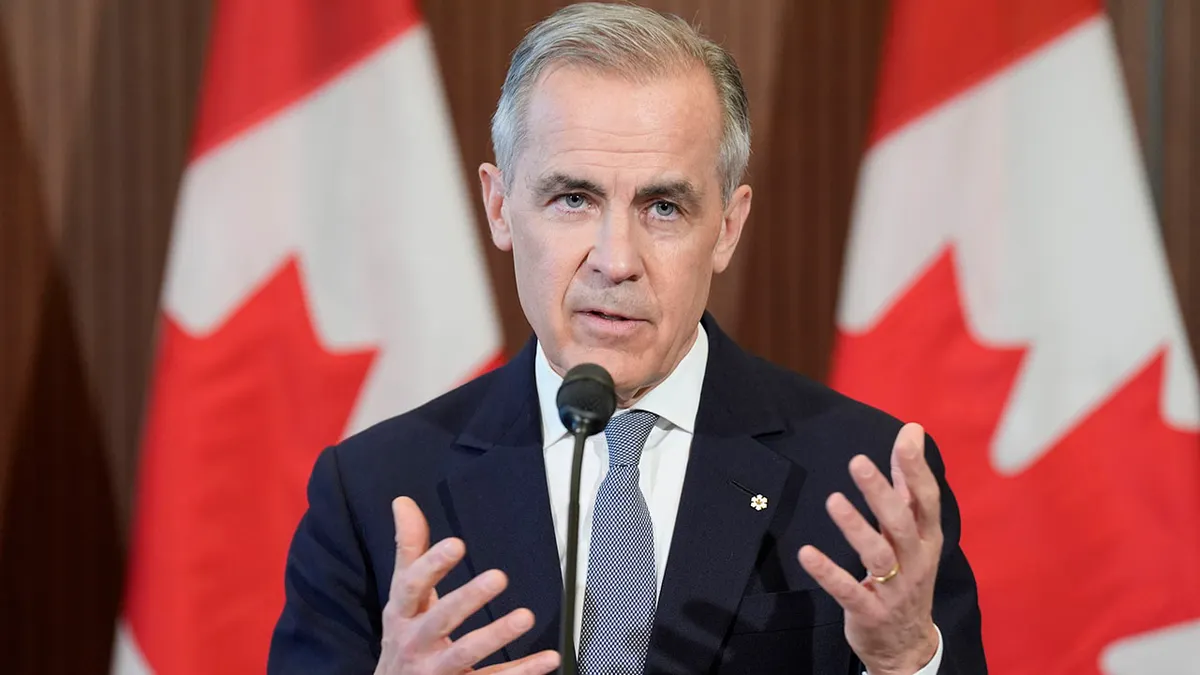
The Tensions Behind Trump’s Tariffs: A Spotlight on Canada-U.S. Relations
Trump’s Tariffs Strain Canada-U.S. Economic Ties
Analyzing the complex relationship between the United States and Canada amid the looming threat of steep tariffs imposed by President Trump, exploring the reactions from Canadian officials and the potential consequences on both economies.
As the deadline for President Trump’s sweeping tariffs approaches, dubbed ‘Liberation Day’, both sides of the U.S.-Canada border are bracing for economic upheaval. In conversations around the implications of these tariffs, Canadian leaders express their frustration and concern for the future of their trade relationship with the U.S. This piece investigates the underlying sentiments and reactions within Canada as trade tensions rise.
Understanding ‘Liberation Day’
In a bold move, President Donald Trump has announced a significant change in U.S. trade policy. He has dubbed the day he plans to impose new tariffs as ‘Liberation Day.’ This term is not just a catchy phrase; it carries deep implications for American economic independence.
Overview of Trump’s Proposed Tariffs
On April 2nd, Trump is set to impose sweeping new tariffs on several trading partners, including Canada. This is not the first time tariffs have been used as a tool in trade negotiations. However, the scope of these proposed tariffs is particularly alarming. Currently, Canada faces a 25% tariff on its steel, aluminum, and auto sectors. The new tariffs could escalate tensions further.
- Existing Tariffs: Canada is already grappling with significant tariffs.
- Potential Scope: The new tariffs could extend beyond current measures, affecting various sectors.
- Retaliation Risks: Canada has vowed to respond proportionately to any new tariffs imposed.
Economic analysts warn that tariffs could initiate a trade war that might affect both consumer prices and employment on both sides of the border. This raises the question: who will really pay the price for these tariffs?
Significance of ‘Liberation Day’
The term ‘Liberation Day’ suggests a dramatic assertion of U.S. economic independence. But what does this really mean? For many, it implies a break from traditional trade relationships. Trump’s rhetoric paints a picture of America reclaiming its economic power. However, this approach could lead to unintended consequences.
Premier Andrew Furey of Newfoundland and Labrador expressed concerns about the ramifications of these tariffs. He stated that Canadians did not invite this trade conflict. Instead, they feel confused, frustrated, and angered by the ongoing escalation. This sentiment reflects a broader unease among Canadians regarding their economic future.
Historical Precedents of Tariffs and Their Effects on Canada
Historically, tariffs have been a contentious issue. They can protect domestic industries, but they also risk retaliation and trade wars. The relationship between the U.S. and Canada has been characterized by deep economic integration. This integration has fostered mutual benefits over the years.
Furey emphasized that the long-standing economic success between the two countries is now at risk. He pointed out that a collaborative approach could foster job creation and economic growth. Yet, the looming threat of tariffs complicates this relationship.
Canada’s new Prime Minister, Mark Carney, condemned the tariffs, warning that they could irreparably alter the traditional relationship between the two nations. This is not just about economics; it’s about national identity and sovereignty. Canadians feel a protective resolve over their identity, and historical ties exemplify the strong relationship shared by the two nations.
For instance, during the September 11 attacks, Canada welcomed thousands of stranded passengers. They have fought side by side in various conflicts. The cultural connection is evident in sports, particularly hockey. These shared experiences create a complex backdrop for the current political climate.
As the countdown to April 2nd continues, uncertainty looms. CNN’s Senior White House reporter Kevin Liptak noted that rising uncertainty ahead of the tariff implementation is causing global market jitters. Despite Trump’s claims of a beneficial economic outcome, the specific details of the tariffs remain murky.
Some within the administration suggest a potential for “dollar-for-dollar” reciprocal tariffs. Others consider a more universal approach that could disrupt global economics significantly. Economic advisors like Peter Navarro have even suggested that these tariffs could generate up to $6 trillion in revenue over ten years. If realized, this would be the most considerable tax increase since World War II.
Ultimately, the burden of these tariffs will likely fall on American consumers. As stakeholders hold their breath regarding the administration’s final decision, the intricate relationship dynamics between the U.S. and Canada are under scrutiny. The fear of a looming trade war is palpable, and the implications are vast.
Canadian Perspectives on Economic Retaliation
Overview of Premier Andrew Furey’s Stance
Premier Andrew Furey of Newfoundland and Labrador has been vocal about his concerns regarding the recent tariffs imposed by the United States. He views these tariffs as a significant threat to the economic stability of Canada. Furey emphasizes that Canadians did not ask for this trade conflict. In his words,
“Canadians never asked for any of this. We’re left often confused, frustrated, at times angered and upset by this round of tariffs.”
This sentiment resonates with many Canadians who feel caught in the crossfire of U.S. trade policies.
Furey has made it clear that the Canadian response to these tariffs will be measured and proportional. He believes in the importance of maintaining Canadian values, which include fairness and mutual respect in trade relations. The Premier highlights the interconnected nature of the U.S. and Canadian economies, stating that they are built on shared resources and mutual benefit. This relationship, he argues, is being jeopardized by the ongoing tariff threats.
Public Sentiments on Trump’s Trade Policies
The public sentiment among Canadians regarding President Trump’s trade policies is mixed. Many Canadians express feelings of confusion and frustration. They are concerned about the potential economic fallout from these tariffs. The 25% increase in tariffs on Canadian steel and aluminum industries has raised alarms across various sectors. The fear of job losses looms large, particularly in industries that are heavily reliant on exports to the U.S.
- Canadians feel a strong sense of injustice regarding the tariffs.
- There is a growing concern about the impact on jobs and the economy.
- Many Canadians are calling for a united front against these trade measures.
Furey’s remarks reflect a broader sentiment among Canadians who feel that their country’s sovereignty is at stake. The Premier has pointed out that the rhetoric from the U.S. administration threatens not just economic ties but also the cultural and historical connections that bind the two nations.
Potential Economic Ramifications
The economic implications of these tariffs are profound. Experts warn that the burden will likely fall on consumers, both in Canada and the U.S. The projected job losses in impacted sectors could be significant, leading to a ripple effect throughout the economy. Industries such as steel, aluminum, and automotive manufacturing are particularly vulnerable.
Furey has highlighted that the tariffs create a “lose-lose” situation for consumers on both sides of the border. He argues that instead of fostering economic growth, these measures could lead to increased prices for everyday goods. The uncertainty surrounding the tariffs is causing jitters in global markets, as stakeholders brace for the potential fallout.
Furthermore, the Premier has pointed out that the long-standing economic success between Canada and the U.S. is at risk. The collaborative approach that has historically fostered job creation and economic growth is being undermined by these unilateral trade measures. As Furey puts it, the relationship between the two countries is built on trust and cooperation, which is now being tested.
In light of these developments, Premier Andrew Furey’s stance reflects a deep concern for the future of Canadian consumers and the economy. The sentiments shared by Canadians echo a desire for clarity and fairness in trade relations. As the situation evolves, the implications of these tariffs will continue to unfold, impacting various sectors and the overall economic landscape.
Navigating National Identity and Trade Relationships
The relationship between Canada and the United States has always been complex. It is a blend of shared values, mutual respect, and, at times, tension. Recently, the introduction of tariffs by President Donald Trump has stirred emotions and raised questions about Canadian sovereignty and national pride. This blog explores the impact of these tariffs, the personal stories of Canadian officials, and the historical context of U.S.-Canada ties.
The Impact of Tariffs on Canadian Sovereignty
Trump’s tariffs, often referred to as “Liberation Day,” are set to affect various sectors in Canada, including steel, aluminum, and automobiles. These tariffs are not just economic measures; they are perceived as threats to Canadian independence. Premier Andrew Furey of Newfoundland and Labrador expressed the confusion and frustration felt by Canadians. He stated, “It’s incredibly hurtful for Canadians to feel threatened by an imperialistic agenda from the U.S.” This sentiment resonates deeply among Canadians who pride themselves on their sovereignty.
The emotional toll is significant. Canadians are grappling with the reality that their independence is under threat. The tariffs symbolize more than just financial implications; they represent a challenge to national identity. The question arises: How can a nation maintain its pride when faced with external pressures?
Personal Anecdotes from Canadian Officials
Canadian officials have shared personal stories that highlight the emotional impact of U.S. relations. Premier Furey, for instance, has family ties in the U.S., which adds a layer of complexity to his feelings about the current political climate. He reflects on the mixed emotions of hurt and frustration that many Canadians are experiencing. This personal connection underscores the intertwined nature of the two nations.
Moreover, the historical context of U.S.-Canada relations cannot be overlooked. Canadians remember the times when their country welcomed thousands of stranded passengers during the September 11 attacks. They recall fighting side by side in various conflicts and the cultural connections, particularly in sports like hockey. These shared experiences foster a sense of unity and pride that is now being tested.
Historical Context of U.S.-Canada Ties
The historical ties between Canada and the U.S. are deep-rooted. For decades, both nations have enjoyed a relationship characterized by economic integration and security cooperation. However, the current tariff threats have the potential to alter this relationship irreparably. Prime Minister Mark Carney has condemned the tariffs, emphasizing that they could jeopardize the long-standing economic success shared by the two countries.
Canadians take pride in their identity, which is often juxtaposed with the challenges posed by trade wars. The emotional impact of these tariffs is palpable, as Canadians feel a protective resolve over their independence. They are not just fighting for economic stability; they are fighting for their national identity.
The Broader Implications of Tariffs
The economic implications of these tariffs extend beyond Canada. CNN’s Senior White House reporter Kevin Liptak noted that rising uncertainty is causing global market jitters. While Trump claims that these tariffs will lead to economic benefits, many experts warn that the burden will likely fall on American consumers. The looming trade war raises questions about the broader consequences for both nations.
As the countdown to the implementation of these tariffs continues, stakeholders are left to ponder the future of U.S.-Canada relations. The intricate dynamics between the two countries are at a crossroads. Will they find a way to navigate this turbulent period, or will the tariffs create a rift that is difficult to mend?
The ongoing trade tensions between Canada and the U.S. serve as a reminder of the fragility of national identity in the face of economic challenges. As Canadians grapple with the emotional toll of Trump’s tariffs, they are reminded of their shared history and values. The journey ahead is uncertain, but one thing is clear: Canadians are united in their resolve to protect their sovereignty and national pride. The battle for identity amidst trade wars is not just an economic issue; it is a deeply personal one for many Canadians.
TL;DR: The impending tariffs from Trump signify escalating tensions between the U.S. and Canada, causing widespread concern among Canadian officials regarding economic repercussions and national sovereignty.
CanadaRelations, TradeTensions, LiberationDayTariffs, TrumpTariffs, CanadianSovereignty, CanadaResponse, U.S.Tariffs, EconomicImpact
#CanadaRelations, #U.S.Tariffs, #TradeTensions, #CanadaResponse, #CanadianSovereignty, #LiberationDayTariffs, #TrumpTariffs, #EconomicImpact,##TrumpTariffs, #CanadaUSRelations, #TradeWar, #EconomicSovereignty, #LiberationDay, #AndrewFurey, #MarkCarney, #GlobalEconomy, #TariffTensions, #USPolitics

